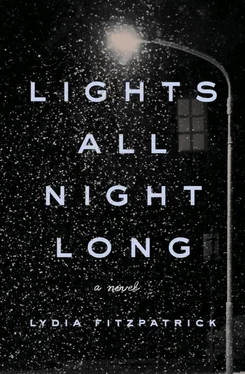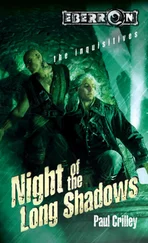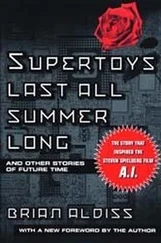Lydia Fitzpatrick - Lights All Night Long
Здесь есть возможность читать онлайн «Lydia Fitzpatrick - Lights All Night Long» весь текст электронной книги совершенно бесплатно (целиком полную версию без сокращений). В некоторых случаях можно слушать аудио, скачать через торрент в формате fb2 и присутствует краткое содержание. Город: New York, Год выпуска: 2019, ISBN: 2019, Издательство: Penguin Press, Жанр: Современная проза, на английском языке. Описание произведения, (предисловие) а так же отзывы посетителей доступны на портале библиотеки ЛибКат.
- Название:Lights All Night Long
- Автор:
- Издательство:Penguin Press
- Жанр:
- Год:2019
- Город:New York
- ISBN:978-0-52555-873-6
- Рейтинг книги:3 / 5. Голосов: 1
-
Избранное:Добавить в избранное
- Отзывы:
-
Ваша оценка:
- 60
- 1
- 2
- 3
- 4
- 5
Lights All Night Long: краткое содержание, описание и аннотация
Предлагаем к чтению аннотацию, описание, краткое содержание или предисловие (зависит от того, что написал сам автор книги «Lights All Night Long»). Если вы не нашли необходимую информацию о книге — напишите в комментариях, мы постараемся отыскать её.
Lights All Night Long — читать онлайн бесплатно полную книгу (весь текст) целиком
Ниже представлен текст книги, разбитый по страницам. Система сохранения места последней прочитанной страницы, позволяет с удобством читать онлайн бесплатно книгу «Lights All Night Long», без необходимости каждый раз заново искать на чём Вы остановились. Поставьте закладку, и сможете в любой момент перейти на страницу, на которой закончили чтение.
Интервал:
Закладка:
“So this weekend,” she said, “we’ll see you for supper.”
It was around this time—December of Ilya’s last winter in Berlozhniki—that a body was found in a snowbank on Ulitsa Gornyakov.
Seventy years earlier, prisoners had laid Ulitsa Gornyakov, pouring hot asphalt down the gentle slope from Berlozhniki, past the mines, to the camp. Over the years, through the Great War, through Brezhnev and glasnost, through seventy freezes, the asphalt had cracked and furled and canted until it jarred even the sturdiest of axles. Then the refinery was built, and the road was dug up. It was widened and smoothed so that two tankers could pass with a meter margin. Most of the roads in Berlozhniki disappeared under snow each winter, leaving the buildings lonely and illogical without their connections, but Gazneft cleared Ulitsa Gornyakov religiously, and the body was found by a plower named Mikhail Tukhachevsky early one morning.
Mikhail Tukhachevsky told the Vecherniye Berlozhniki that each type of snow feels different to the plow. There is snow that’s crusted with ice, which makes the plow buck then dip, buck then dip. Wet snow is heavy enough to drive the plow toward the shoulder, heavy enough to have your forearms aching at the end of a shift from holding the wheel straight. And then there is pillow snow, Tukhachevsky said. Light and dry, easy as breathing. It had been pillow snow that morning, and so Mikhail Tukhachevsky had noticed the instant the plow took on weight, dragged left, and went light again. He climbed down from the cab and circled back behind the truck. In the red of his taillights he saw a woman’s leg slanting up out of the snow. Straight up, he said, like a joke, except that she was barefoot, and so he’d known that she was dead. He dug for her face anyway, just to be sure.
Her name was Yulia Podtochina. If someone had not left the paper in the communal bathroom, Ilya would not have even read the article. If Yulia Podtochina had not worked at the refinery, he would not have taken much notice. There were a few deaths from exposure every year in Berlozhniki, drunks or junkies who got confused about where home was and wandered the wrong way. But Yulia worked at the cafeteria in the refinery: fitting the hot trays into their metal frames, wiping down tables, mixing the soda water and soda syrup in the machines, doling out pelmeni and cutlets to the neftyaniki. She had his mother’s exact job, except that she worked the opposite shift. She slept while his mother worked; she worked while his mother slept. She was like his mother’s shadow, in a way, and they were joined by that one moment each afternoon when their buses passed on Ulitsa Gornyakov, and each driver pressed the horn, and the two blasts were sharp and short in the cold.
She had been murdered. Killed with violent intent , the paper said, though how someone could be killed without violent intent, Ilya wasn’t sure. There weren’t any more details about her death, but the little Ilya read about her was a relief to him because it quickly became clear that she was nothing like his mother. Yulia Podtochina was young. Only twenty-four. She’d grown up in Arkhangelsk and moved to Berlozhniki two years ago. She was married to a childhood sweetheart who still lived in Arkhangelsk, working the ice barges. The paper had not been able to reach her husband for comment, and according to a cousin of Yulia’s who lived in Berlozhniki, she and her husband hadn’t seen each other in over a year.
One Friday after work, Yulia was supposed to meet up with this cousin—they were going to get a drink at Dolls—but when she didn’t show, her cousin didn’t worry. Their plans had been loose, and Yulia had friends at work, friends from her building, friends everywhere, it seemed, and her cousin figured that she’d found a better party. That Friday, she hadn’t boarded the bus with her colleagues. She told them that she wanted to walk home, which was strange, but not unheard of. The cold had abated a bit that afternoon—the pillow snow wouldn’t begin until that night—and it was only five kilometers to the kommunalkas and three more to town. Yulia set out. The departing bus passed her just outside the refinery gates, and a few people on the arriving bus—Ilya’s mother’s bus—saw her halfway to town, by the Tower, a cigarette in one hand and her cell phone in the other, and that was it. No one worried about her. No one called the police. She was missing for only a day before Mikhail Tukhachevsky felt her weight on his plow.
The picture of her was from her wedding day. She was in a white minidress, tight as a tourniquet, and white platform heels. Her legs were scrunched together at the knees like she was freezing cold, and a man’s Adidas jacket was draped over her shoulders. Her hair was curled and piled on her head. A papier-mâché dove stuck out of it like a cocktail decoration. She had a shy sort of smile, but there was a gloss to her cheeks and eyes that suggested that she wasn’t all that shy. She was pretty. Pretty enough was the thought that popped into Ilya’s mind when he looked at her, though he felt guilty thinking it, because he wasn’t even sure what he meant by enough and because she was dead. No one was in custody for the crime, and the police were pursuing all leads. Any information about the crime was to be reported to the Berlozhniki police department.
“Why would she walk home dressed like that?” Babushka said, when Ilya showed her the article.
“She wasn’t wearing that when she walked home,” Ilya said. “That’s her wedding dress.”
“Her wedding dress?! Case closed! You walk around in a dress that short and bad things happen.”
“She didn’t walk around in that,” Ilya said. “She got married in it.”
“Even worse!” Babushka said.
He asked his mother if she’d seen Yulia from the bus that day, and his mother had shaken her head and said, “She was a nice girl. But too dreamy. She served the golubtsy once and it was so frozen on the inside that Igor Zubkov chipped a tooth. She was a kid, you know. Into things.”
Ilya didn’t say anything. Since Vladimir had left, there was a new wistfulness to the way his mother spoke about kids, like the things they got into were inevitable.
In the communal kitchen, over the steam and bubble of their soup pots, the babki said that it was strange that she hadn’t seen her husband in a year. They said it was strange that she’d been found so close to the Tower.
In the bathroom line, old men talked about how in winters like this one the spirits woke. They talked about the brothers who had jumped to their deaths off the top of Ilya’s building, about how many prisoners hadn’t been properly buried. They talked about how the snow had covered the crosses completely. They said the road was built on death and that ancient anger doesn’t die. A spirit had killed Yulia, they said. A guard or a prisoner, depending on who was talking and whether their ancestors had been guards or prisoners.
Ilya read everything about Yulia that he could find. A later article reported that she’d been stabbed, that her cheeks had been slashed. The Berlozhniki police finally managed to get in touch with her husband—he’d been out on an ice ship for months and knew nothing of her death. All he could offer was that Yulia was a partier and had gotten into some stuff that he didn’t approve of. After that, there were no leads and no new details released.
A week later a teenager was attacked by a bear outside of Syktyvkar, and there was an outbreak of listeria from some baloney sold at the Minutka, and the mayor began his reelection campaign. Posters of him were hung from all the light posts on the square, and he rode in circles around the kommunalkas, shouting into a loudspeaker about how Berlozhniki’s time had come, about how Berlozhniki’s youth needed to stay and procreate, and Yulia was pretty much forgotten.
Читать дальшеИнтервал:
Закладка:
Похожие книги на «Lights All Night Long»
Представляем Вашему вниманию похожие книги на «Lights All Night Long» списком для выбора. Мы отобрали схожую по названию и смыслу литературу в надежде предоставить читателям больше вариантов отыскать новые, интересные, ещё непрочитанные произведения.
Обсуждение, отзывы о книге «Lights All Night Long» и просто собственные мнения читателей. Оставьте ваши комментарии, напишите, что Вы думаете о произведении, его смысле или главных героях. Укажите что конкретно понравилось, а что нет, и почему Вы так считаете.












